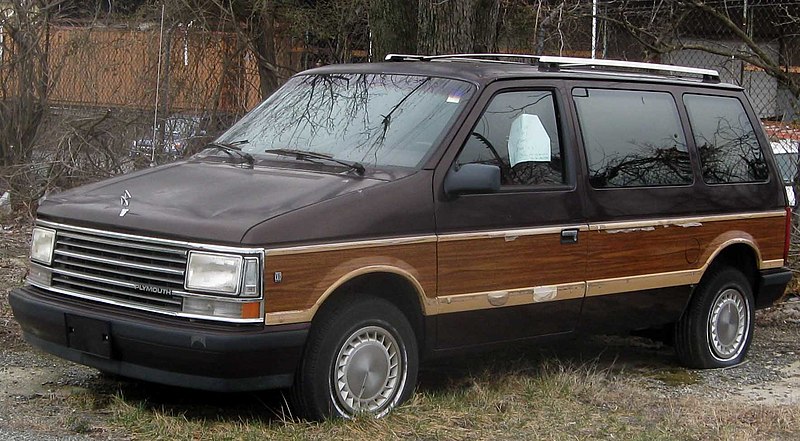The Church Van

1990 Plymouth Voyager. Photograph courtesy of Wikimedia Commons.
Every Sunday morning would start the same way. Grandma Gayle, after her overnight shift as a nurse’s assistant, would walk into the room catty-corner from hers, knock, and yell, “Grandson!”—though Grandman’s yelling barely registered a decibel. So she would gently nudge my side and remind me that we had to get going. If there was time, bath; if not, shower. I’d make my dash to the kitchen, where Grandma would have prepared the kielbasa sausages fried, eggs fried, and cheddar cheese melted on a bialy or bagel bought from the deli up the street and accompanied by Tropicana Berry Punch in a glass. Church wouldn’t start for four hours, at least. But we started early—my grandma, grandpa, and me getting into the 1994 Plymouth Voyager, normally parked in the back lot of their home, which was wedged between where Brownsville and East New York meet. We traversed every borough to pick up congregants; on Sundays, the Voyager served as the church van.
The bottom half of the Voyager must once have been a pristine teal, but it had faded into an odd mixture of light blues and grays. The top half was covered in homey faux wood paneling. The seating legally accommodated seven but in actuality the church van would fit as many people who did not mind sitting on laps and on the tan carpeted floor, or squeezing into corners. The cassette deck remained unused. As we got going, 1010 WINS would blast through the stereo with a crackle and a burst of static, a narrated mapping for Reverend Gayle, my grandpa, pastor of the church in the Bronx not far from Gun Hill, who would drive this first leg. Plus, a dissonant, semi-melodic mumble of hymns from Grandma, seated in the front passenger seat, as Grandpa—ever the nervous driver—would intermittently and suddenly press his right foot on the brake. Grandpa and I never understood what Grandma was trying to sing, but it always prompted Grandpa, after two minutes, to yell, “Marlene, ’top ya noise!”
This first leg of the ride was relatively smooth because it was short and still within a part of Brooklyn that Grandpa felt comfortable navigating. After fifteen minutes, Grandpa’s duties as church van driver would be passed on to “Uncle Robbie”—Dad’s best friend, my godfather, and Grandpa’s right-hand man—whom we picked up first. Grandpa would shift to the front passenger seat, Uncle Robbie would take the wheel, and Grandma would become my seat partner, which I appreciated because she usually packed candy to freshen my kielbasa breath. And Grandma would nearly cradle me in the front row.
Quickly, Uncle Robbie’s voice would add to the sounds of 1010 WINS, Grandma’s singing, and Grandpa’s audible aggravation: “Ya don’ kno, where ya go, mi headed to Ellis!”—our last stop in Brooklyn before drove more hurriedly to the other four boroughs. Add to the church van sounds the shocks, which were shocked that they ought ever to be used, every passenger feeling every pot hole, speed bump, unexpected slam on the brakes. Once we got to Ellis—another relative, this one related speciously by blood—she’d enter with so much bluster that I’d lose my seat and so would Grandma. Ellis’s first name, Josephine, had been replaced by her title, “Missionary,” which came with no official duties—it was just an honorific to sate her clamor for attention, prestige, and honor in our tiny church. Because more pickups were imminent, I sat on a hump in the back right-hand corner that covered the indent of the right rear wheel, just before we waded through the ever-present traffic on the RFK Bridge going toward the Bronx.
“Ellis!” Grandpa would exclaim every Sunday.
“Yes, Rev,” she’d respond to Grandpa.
“You ugly!” he’d joke.
“Not as ugly as you!” she’d say back, the only kind of response that would put a stop to Grandma’s humming, 1010 WINS, and the clamor from Uncle Robbie, and bring about a brief break for laughter.
The hump became the seat on which I’d learn about the old country, a gloss descriptor for the countries from which they all came: Missionary Ellis from Cuba, Grandma and Grandpa from Jamaica, Uncle Robbie from Guyana. But that hump-seat was where I learned about how they examined their new country. It’s where I learned how to talk smack, how to not smack while chewing on Grandma’s mints, how to sell wolf tickets, how to pray, how to accept tough love from congregants who would fix my tie, how to pretend to hate the worldly things our church would make into sins, like drinking, partying, playing cards, and watching movies.
When Chrysler discontinued production of the Plymouth Voyager in 2003, I received no notification—no eulogy for the defunct vehicle—but I thought fondly of that one: the boxy church van with its diminutive stature accommodating far more people, experiences, hope, dreams than it was ever built to do, and which taught me far more than I ever expected to learn.
Caleb Gayle is a professor at Northeastern University, a contributing writer at the New York Times Magazine and the author of the book We Refuse to Forget.
Copyright
© The Paris Review
